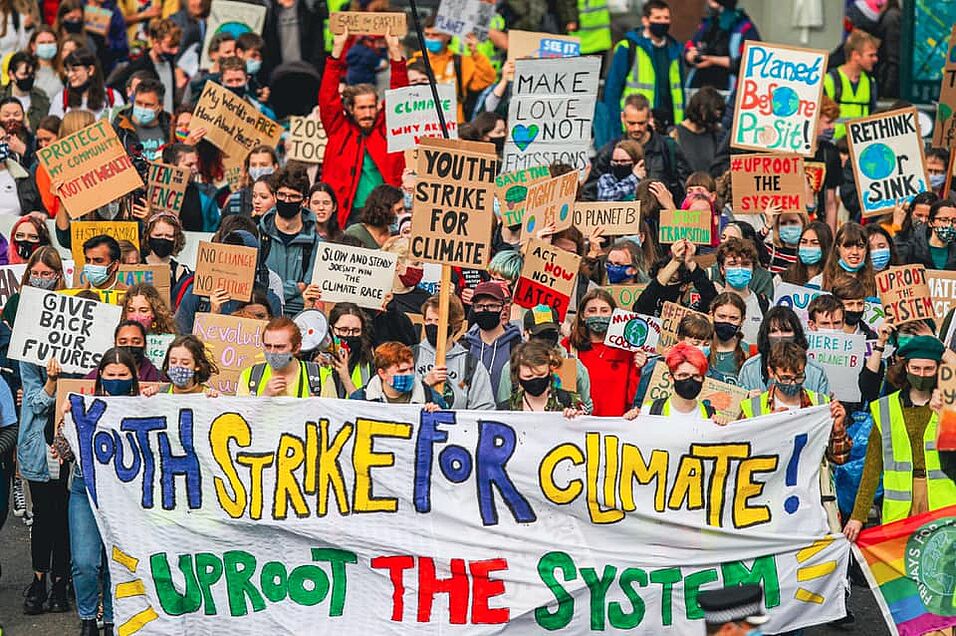Climate change has been called the defining crisis of our time. In the last few years, millions of people have taken to the streets to demand urgent action on the escalating ecological emergency. Social media have had great importance in the development of the movement. For example, the virality of posts on Twitter and Instagram has quickly transformed the activist Greta Thunberg into an iconic figure, attracting supportive but also openly hostile reactions. The importance of images in the online communication of the movement and the emotions moving these activists and those who attack them online draw attention to the symbolic and emotional role of images for social movements.
The PolarVis project will examine the role of visual content in processes of political polarization and belonging in the digital age by focusing on the intergenerational issue of climate change and the green transition. The visual dimension is increasingly salient online, where it underpins both conflict and connection. Photos, videos, and memes offer a powerful form of political communication. Political actors use them to frame issues, mobilize support and build or undermine legitimacy, and citizens and platforms play a part by modifying, sharing, and amplifying them.
This research project will forge a unique interdisciplinary framework to study the implications of networked visual persuasion on a large scale and to understand how, why, and with what consequences visual content becomes a mechanism of polarization and belonging in Europe. In particular, it will address four key questions: (1) How do movements use visual content in their communication? (2) What are the characteristics of this visual content, and how does it form visual narratives? (3) How do online audiences react to the visual content? (4) How does this content spread online and allow like-minded or opposed groups to emerge?
By combining network analysis, computational text and image analysis, and in-depth qualitative approaches, the project will advance the study of polarization in its political, societal, and affective dimensions, illuminating dilemmas facing stakeholders that work to engage citizens with climate change issues online.
Prof. Annie Waldherr (PI) and Dr. Nicola Righetti (Co-PI) lead the project at the University of Vienna which is part of a large international and interdisciplinary collaboration within the CHANSE initiative. Partners include the coordinator of the consortium Alexandra Segerberg (Uppsala University) as well as Luca Rossi (IT University of Copenhagen), Daniel Oross (Centre for Social Sciences, Hungarian Academy of Sciences), and Nicole Doerr (University of Copenhagen).
Der Klimawandel wird als die entscheidende Krise unserer Zeit bezeichnet. In den letzten Jahren sind Millionen von Menschen auf die Straße gegangen, um dringende Maßnahmen gegen den eskalierenden ökologischen Notstand zu fordern. Die sozialen Medien haben bei der Entwicklung der Bewegung eine große Rolle gespielt. So wurde die Aktivistin Greta Thunberg beispielsweise mit Hilfe viraler Beiträge auf Twitter und Instagram schnell zu einer Ikone, die viele zustimmende, aber auch offen feindselige Reaktionen hervorruft. Die Bilder und Emotionen, mit denen diese Bewegung und ihre Gegner online mobilisieren, machen die zentrale symbolische und emotionale Rolle von Bildern für soziale Bewegungen insgesamt deutlich.
Das PolarVis-Projekt wird die Rolle visueller Inhalte in politischen Prozessen der Polarisierung und Identitätsbildung im digitalen Zeitalter untersuchen, indem es auf das generationenübergreifende Thema des Klimawandels und der grünen Wende fokussiert. Die visuelle Dimension wird in der Online-Kommunikation zunehmend dominant und stärkt gleichermaßen Konflikte wie auch Verbindungen. Fotos, Videos und Memes stellen eine einflussreiche Form der politischen Kommunikation dar. Politische Akteure nutzen sie, um Themen zu formulieren, Unterstützung zu mobilisieren sowie Legitimität aufzubauen oder zu untergraben. Bürger und Plattformen spielen eine Rolle, indem sie diese verändern, teilen und verstärken.
Dieses Forschungsprojekt wird einen einzigartigen interdisziplinären Rahmen schaffen, um die Auswirkungen vernetzter visueller Persuasion in großem Maßstab zu untersuchen und zu verstehen, wie, warum und mit welchen Folgen visuelle Inhalte zu einem Mechanismus der Polarisierung und Identitätsbildung in Europa werden. Dabei werden insbesondere vier Schlüsselfragen behandelt: (1) Wie nutzen soziale Bewegungen visuelle Inhalte in ihrer Kommunikation? (2) Was sind die Merkmale dieser visuellen Inhalte, und wie bilden sie visuelle Narrative? (3) Wie reagiert das Online-Publikum auf die visuellen Inhalte? (4) Wie verbreiten sich diese Inhalte online und ermöglichen das Entstehen von gleichgesinnten oder gegnerischen Gruppen?
Durch die Kombination von Netzwerkanalyse, computergestützter Text- und Bildanalyse und qualitativen Ansätzen wird das Projekt die Untersuchung der Polarisierung in ihren politischen, gesellschaftlichen und affektiven Dimensionen vorantreiben und die Dilemmata beleuchten, mit denen Akteure konfrontiert sind, die online zu Fragen des Klimawandels mobilisieren.
Prof. Annie Waldherr (PI) und Dr. Nicola Righetti (Co-PI) leiten das Projekt an der Universität Wien, das Teil eines großen internationalen und interdisziplinären Konsortiums im Rahmen der CHANSE-Initiative ist. Zu den Partnern gehören die Koordinatorin des Gesamtprojekts Alexandra Segerberg (Universität Uppsala) sowie Luca Rossi (IT Universität Kopenhagen), Daniel Oross (Zentrum für Sozialwissenschaften, Ungarische Akademie der Wissenschaften) und Nicole Doerr (Universität Kopenhagen).

